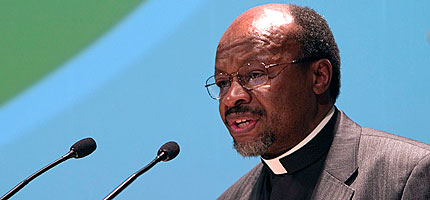Lutheran World Federation (LWF) General Secretary Rev. Dr Ishmael Noko delivers his report to the plenary on 21 July during the LWF Eleventh Assembly, 20-27 July 2010, in Stuttgart, Germany. © LWF/Erick Coll
21.07.2010
“In Fellowship and Care For One Another, We Recognize the Face of God”
General Secretary Rev. Dr Ishmael Noko Relates “Daily Bread” to Caring for the World
STUTTGART, Germany, 21 July 2010 – A changing world, a more inclusive communion of Lutheran churches, closer ecumenical relations and the challenge of serving others are some of the issues the Lutheran World Federation (LWF) will address in the years ahead, said General Secretary Rev. Dr Ishmael Noko in his report to the LWF Eleventh Assembly.
Referring to the Assembly theme, Noko said that “daily bread” had strong “spiritual significance.” It was in the act of breaking bread that the risen Lord Jesus was revealed to the travellers on the road to Emmaus, he said. “And it is in fellowship and care for one another that we recognize the face of God.”
Noting that the last Assembly in Germany was in 1952, Noko said it was “an act of spiritual courage” for Lutherans to meet in Hanover during the post-World War II era and at the onset of the Cold War. “The world has changed since 1952. Developments such as the fall of the Berlin Wall and the liberation of [South Africa’s] Nelson Mandela released forces that have reshaped our global village,” Noko said. “The forces of globalization both connected and disconnected people,” he added. “The gap between those who do not have enough to eat and those who have far more than they need has grown tremendously”, and in Europe “the situation of minority peoples and communities has become an increasingly heated political issue.”
The General Secretary said that the equitable participation in God’s mission is “the hallmark of an inclusive communion.” Member churches were therefore urged to take appropriate steps towards the ordination of women and, where this was not the case, to put in place “practices of equality.” Sometimes decisions receive strong support at assemblies, Noko said, but “do not enjoy much subsequent follow-up by the churches.”
Noko noted that 2017 will be the 500th anniversary of the Evangelical Reformation. “It is my hope that we might find an appropriate way to mark this anniversary,” he said, expressing hope that the celebration would acknowledge the achievements made in overcoming condemnations of the past, making visible the unity of the church and seeking to discover, “the message of the Evangelical Reformation for the whole of the church today.”
He reported to the Assembly that a number of commemorative activities had underscored the “wide ecumenical significance” of the signing of the Joint Declaration on the Doctrine of Justification (JDDJ) in 1999, which he described as “a powerful sign of the value of the LWF as an instrument for ecumenical progress.” In Augsburg on 31 October 2009 Lutherans, Roman Catholics and Methodists celebrated the 10th anniversary of the signing of the Declaration, and in Wittenberg the planting of commemorative trees marked the event. Noko said that the dialogue relating to the JDDJ was continuing.
Continuing the ecumenical theme, Noko previewed the action that will take place during the Assembly to redefine Lutheran relations with Mennonites. “Our Lutheran confessions have some very harsh things to say [about Mennonites],” he said, noting that even Martin Luther used theological arguments to support persecution of members of the Anabaptist tradition. Assembly delegates will be asked to consider an action asking for forgiveness, “from God and from our Mennonite sisters and brothers,” for past persecutions and violence.
Interfaith diapraxis – cooperation across religious borders – has been a special focus of the life of the LWF since the 2003 Assembly in Winnipeg, Canada. Noko highlighted the work taking place in Mauritania, Cambodia and in other places, where people of other faiths are working for and with the LWF in the pursuit of a shared humanitarian objective. “Diapraxis provides a platform from which people of all faiths can jointly address many common concerns and in the process build deeper and stronger relationships.”
The LWF is also promoting dialogue on issues relating to marriage, family and sexuality, Noko said, noting that the Council had approved discussion guidelines for member churches.
“From the reports received so far, it is clear that the member churches are at various stages of reflection and action, and that different positions are emerging on these issues,” he said. Some churches have proceeded with policies that endorse same-sex unions or allowing gay or lesbian clergy, but other Lutheran churches oppose such actions. Noko said that the general consensus in pre-Assembly meetings was that these issues not be dealt with by the Assembly but that the process be allowed to continue until 2012, as originally recommended by the Task Force.”
(737 words)
Full text of the LWF General Secretary’s report

